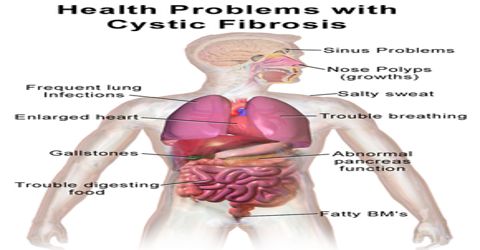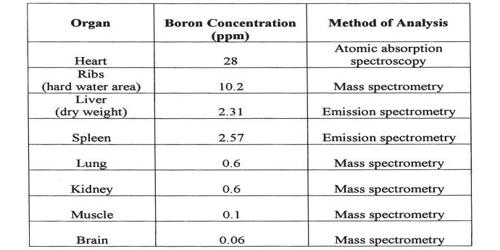Cystic fibrosis is a disease that changes how your body makes mucus and sweat. It affects how well your lungs, digestive system, and few other body parts exertion. It’s caused by a flawed gene. It is a serious genetic situation that causes rigorous harm to the respiratory and digestive systems. This harm often results from a buildup of thick, sticky mucus in the organs. The most usually affected organs include the:
- lungs
- pancreas
- liver
- intestines
Cystic fibrosis affects the cells that produce sweat, mucus, and digestive enzymes. Normally, these secreted fluids are thin and smooth like olive oil. They lubricate different organs and tissues, preventing them from getting too dry or infected. In people with cystic fibrosis, however, a defective gene causes the fluids to become wide and sticky. Instead of acting as a lubricant, the fluids clog the ducts, tubes, and passageways in the body. This can lead to life-threatening problems, including infections, respiratory failure, and malnutrition. It’s critical to get treatment for cystic fibrosis correct away. Early on diagnosis and treatment are important for improving quality of life and lengthening the probable lifespan.
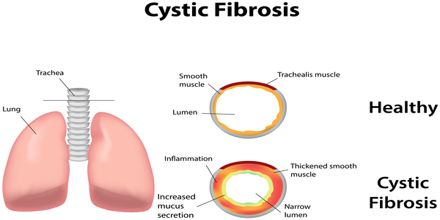
Symptoms
Screening of newborns for cystic fibrosis is now performed in every state in the United States. As a result, the situation can be diagnosed within the first month of life, before symptoms grow. For people born before newborn screening was performed, it’s vital to be aware of the signs and symptoms of cystic fibrosis.
Cystic fibrosis signs and symptoms differ, depending on the harshness of the disease. Even in the same person, symptoms may worsen or progress as time passes. Some people may not experience symptoms until teens or adulthood.
People with cystic fibrosis have a advanced than usual level of salt in their sweat. Parents often can taste the salt when they kiss their children. Most of the further signs and symptoms of cystic fibrosis influence the respiratory system and digestive system. However, adults diagnosed with cystic fibrosis are more likely to have atypical symptoms, such as recurring bouts of inflamed pancreas (pancreatitis), infertility and recurring pneumonia.
Respiratory signs and symptoms
- A persistent cough that produces thick mucus (sputum)
- Wheezing
- Breathlessness
- Exercise intolerance
- Repeated lung infections
- Inflamed nasal passages or a stuffy nose
Digestive signs and symptoms
- Foul-smelling, greasy stools
- Poor weight gain and growth
- Intestinal blockage, particularly in newborns (meconium ileus)
- Severe constipation
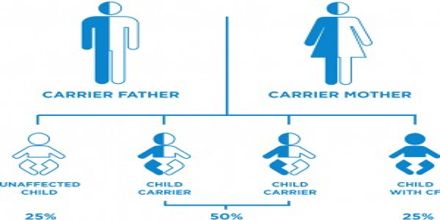
Causes
In cystic fibrosis, a defect (mutation) in a gene changes a protein that regulates the movement of salt in and out of cells. The result is thick, sticky mucus in the respiratory, digestive and reproductive systems, as well as increased salt in sweat.
Many diverse defects can happen in the gene. The type of gene mutation is linked with the severity of the situation.
Children need to inherit one copy of the gene from each parent in order to have the disease. If children inherit only one copy, they won’t grow cystic fibrosis. However, they will be carriers and probably pass the gene to their own children.
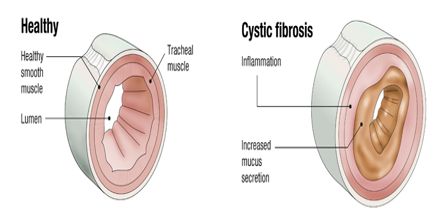
What Are the Risk Factors?
The only risk factor for getting CF is having two parents who carry unusual CF genes and pass the abnormal gene to their child. However, there are factors that contact how severe the CF is.
Genes: CF gene mutations are divided into classes based on how damaged the CFTR protein function is. Classes I, II, and III are usually more severe causing “classic CF.” Classes IV and V are usually milder. Also, other genes called modifier genes can influence a person’s symptoms and outcome.
Environment and lifestyle: People with CF need to consume a very huge number of calories to sustain weight and grow, which can be hard to achieve. Physical activity is also significant to help maintain lungs healthy. People with CF should not smoke or be exposed to secondhand smoke, as it will worsen lung disease. You should also be careful with alcohol intake, and avoid it altogether if you have liver disease.
Age: CF worsens with age. If you have CF, you usually experience a small decline in lung function each year.
